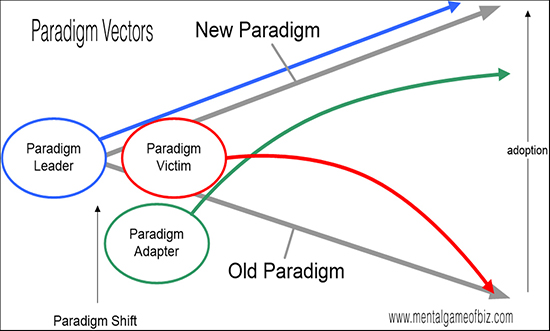
In some industries such as healthcare, lean management has helped companies deal with unexpected and urgent changes without having to put debilitating and unnecessary strain on their employees. Some organizations may decide to use the pandemic as an opportunity to create leaner organizations. There are many ways companies can answer these questions with a variety of implications. How will the organization help alleviate employees’ job security concerns and retain those whom the organization can continue to employ?
#Paradigm shift example how to
These entertainment, sports, concert, airline and restaurant industries and others are being forced to relearn how to be profitable in this new environment. Individuals and organizations are being forced to recognize that things like temporary unemployment assistance cannot substitute for industries where employment depends upon people's willingness to closely cluster with others or travel. Airlines have announced layoffs of nearly 30,000 employees each. Organizations such as Disney and major U.S. Indeed, many industries such as travel, entertainment, and restaurants continue to suffer as the pandemic draws on.

Whereas some industries have begun to rebound, rather than a simple a return to the status quo, the recovery will be driven more by consumer behavior and demand than by a simple desire to return to normalcy. However, even with most stay-at-home orders expiring around the country, the pandemic continued to the delay many individuals’ ability to return to work. The need to rely on unemployment was serving its purpose as temporary assistance that would soon become unnecessary once the pandemic reached its peak and allowed workers to return to the status quo. Initially, most individuals and organizations seemed to maintain a generally positive outlook on the situation. The hope is that, by exploring the short- and long-term implications of these paradigm shifts, practitioners can better prepare in for an unknown post-pandemic future. Finally, we offer relevant organizational considerations and practical actions for practitioners to more effectively adapt to each pandemic-related paradigm shift. We then explore the long-term implications of those paradigm shifts that have only begun to unfold. For each domain, after a brief overview, we examine the paradigm shift caused by the pandemic. Each of these areas has been affected drastically. We use existing research and examples to explore and predict the potential long-term effects of COVID-19 across multiple domains including: job security, financial consequences, remote work, worker well-being, and career attitudes. Many are adjusting to novel organizational demands of the pandemic while hoping for a swift “return to normal.” In time, the implications of these demands may not only shift but have a lasting effect on the way organizations and employees function, resulting in a “new normal.” Whereas the short-term effects have been felt and recognized by many, resulting paradigm shifts caused by the pandemic will likely have long-term effects of unknown scope and impact. The world is at its most interdependent economically and has never faced this level of comprehensive interruption. The spectrum of shifts range from personal to professional, individual to organizational, and across most industries. The COVID-19 pandemic has the potential to result in multiple paradigm shifts in organizations that society, in general, has yet to fully anticipate. This paradigmatic shift altered the foundational understanding of fire and precipitated the exploration of a new scientific theory. The theory of phlogiston was disproved by Antoine Lavoisier through the discovery of combustion.

For over 100 years, this substance was explored as the basis of fire. For example, in the 18th century, scientists heavily researched a substance known as phlogiston. In research, these are rare but impactful shifts that radically change our understanding of phenomena by altering the foundational assumptions upon which our understanding is derived. A paradigmatic shift is a fundamental change in the underlying assumptions of a phenomenon. The difficulty comes in assessing paradigm shifts and the long-term implications of the pandemic. At face value, both actions seem both reasonable and prudent.

In the short-term, organizations have generally engaged in empathic pro-employee responses, and many have radically altered how and where employees work. As the new reality of the pandemic sets in, organizations and individuals grapple with the implications of the virus. The COVID-19 pandemic has altered the business world in unprecedented and historic ways, the effects of which have been felt the world over.


 0 kommentar(er)
0 kommentar(er)
